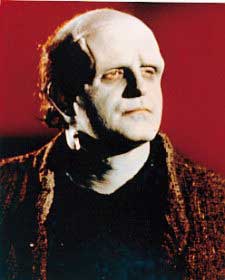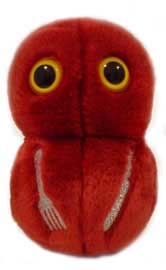From the second row, Brother Quentin put a hand on my shoulder, returning to his main issue with the persistence of a cop skilled at interrogation. "All I'm saying, Odd, is we need to know the name of our enemy. We don't exactly have a crew of trained warriors here. When push comes to shove, if they don't know who they're supposed to be defending against, they'll get so jittery, they'll start swinging baseball bats at one another."I don't usually like Dean Koontz's books. They are a style of horror writing that is fairly gruesome. However, the Odd Thomas books are different.
Brother Augustine gently admonished, "Do not underestimate us, Brother Quentin."
"Maybe the abbot will bless the baseball bats," said Brother Kevin from the third row.
Brother Rupert said, "I doubt the abbot would think it proper to bless a baseball bat to ensure a game-winning home run, let alone to make it a more effective weapon for braining someone."
"I certainly hope," said Brother Kevin, "we don't have to brain anyone. The thought sickens me."
"Swing low," Brother Knuckles advised, "and take 'em out at the knees.Some guy with his knees all busted ain't an immediate threat, but the damage ain't permanent, neither. He's gonna heal back to normal. Mostly."
"We have a profound moral dilemma here," Brother Kevin said. "We must, of course, protect the children, but busting knees is not by any stretch of theology a Christian response."
"Christ," Brother Augustine reminded him, "physically threw the money changers out of the temple."
"Indeed, but I've seen nowhere in the Scripture where our Lord busted their knees in the process."Brother Odd by Dean Koontz
"My name is Odd Thomas. I live an unusual life.Those two sentences came to Koontz complete and with an image of Odd Thomas himself. A disciplined writer, Koontz put these ideas aside until he finished the book he was writing at the time. I heard him talking about this on his podcast and was intrigued. I was intrigued even further when Koontz said that his fan mail for Odd Thomas far and away outstrips any other that he receives. He attributes it to the fact that Odd Thomas is completely humble. That interesting tidbit and remembering that Lofted Nest had commented on the increasingly Catholic nature of Koontz's writing, made me pick up Odd Thomas.
I discovered that one definitely could find those Catholic traces in the Odd Thomas books.
Civilization -- says my friend Ozzie Boone -- exists only because the world has barely enough of two kinds of people: those who are able to build with a trowel in one hand, a sword in the other; and those who believe that in the beginning was the Word, and will risk death to preserve all books for the truths they might contain.Odd Thomas is indeed completely humble and he also is striving as hard as possible to do the task assigned him in life. That task? He sees ghosts and helps convince them to move on to the next step. Odd isn't sure what awaits ghosts beyond this world but his girlfriend, Stormy, has a vision of an army of souls on some great mission in the next world. She calls this life "boot camp" and tells him that it is intended to toughed us up to serve in that army.Brother Odd by Dean Koontz
The ghosts aren't the main problem, however, although they do help him bring wrongdoers to justice, with the help of the town sheriff who is privy to Odd's secret. Odd also sees menacing shadows which he calls bodachs. The shadows themselves do no harm but they only show up around people who are going to be the victims of an extremely gruesome death. As the bodachs show up ahead of time this gives Odd an opportunity to try to figure out what tragedy is unfolding and to stop it. Along the way we also meet other inhabitant's of Odd's little town as well as his practically constant companion, Elvis, who is afraid to move on to the next world but likes keeping Odd company.
The second book, Forever Odd, perhaps should have been called MacGyver Odd. Odd tracks down a strange group of villains who are obsessed with the supernatural and have kidnapped a friend of his in order to make Odd show them ghosts. Although Odd can see ghosts he can't make them manifest to others so this is something of a problem. Practically the entire book takes place in an isolated, burned out casino and Odd spends the entire book figuring out ways to outwit them and rescue his friend. This was distinctly different from the first book but I enjoyed it nonetheless.
Brother Odd is even more different as it is set in a Catholic monastery. Given the setting there is much more scope for bringing in elements of theology, not that one would say theology is Koontz's goal. However, it is obvious that Odd Thomas is on an increasingly spiritual journey and retreating from the world to give himself time to think would seem to be the next step.
It is too bad for Odd that murder, bodachs gathering around the children at the attached school, and a mysterious Russian librarian give him little time to meditate. The dialogue in this book can be really enjoyable, especially the sparring matches that Odd and the librarian have when Odd is trying to discover his true identity. Brother Odd is my favorite of the three books, especially when you consider the touches like this one that are scattered throughout.
"You're a very brave young man, Jacob Calvino."
"She said ... she said don't be scared, we wasn't born to be all the time scared, we was born happy, babies laugh at everything, we was born happy and to make a better world."
"I wish I'd known your mother."
"She said everyone ... everyone, if he's rich or he's poor, if he's somebody big or nobody at all -- everyone has a grace." A look of peace came over his embattled face when he said the word grace. "You know what a grace is?"
"Yes."
"A grace is a thing you get from God, you use it to make a better world, or not use it, you have to choose."
"Like your art," I said. "Like your beautiful drawings."
He said, "Like your pancakes."
"Ah, you know I made those pancakes, huh?"
"Those pancakes, that's a grace."
Tags: Catholicism, Christianity







